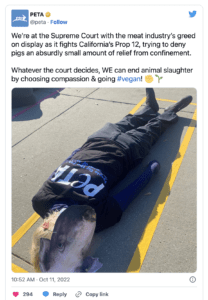FOOD SAFETY NEWS – California’s market for bacon and other pork products is large enough that a May 11 Supreme Court decision apparently has not ended the fight over Proposition 12.
The conservative tilt to that decision was that barring any federal statutory or constitutional restrictions, California is free to put its own dictates on meat sold in the state.
Proposition 12 regulates animal housing requirements that must be followed for access to the California market, meaning that products produced outside of the state must comply with the law. The state that represents about 15 percent of the U.S. market for bacon and other pork products.
Animal activists, who’ve guided Prop 12 since voters approved it in 2018, are now upset because their Supreme Court victory could be lost by legislative action. “Ending Agriculture Trade Suppression” is the title of a new bill just introduced by Sen. Roger Marshall, R-KS.
This new EATS Act (an often-used name for legislation regarding certain food topics) blocks states from dictating production practices beyond their own borders. Rep. Asley Hinson, R-IA, is sponsoring identical legislation in the House.
“The United States is constantly faced with non-tariff trade barriers from protectionist countries, hurting American agriculture access to new markets,” Sen. Marshall said. “The last thing we need is a big state like California imposing its will on ag-heavy states like Kansas with regulations that will restrict our ability to trade among states.”

He said it is an issue of state’s rights.
“If California wants to regulate agriculture in its own state, that’s fine, but California’s rules should not apply to Kansas, whose legislature never approved of these regulations,” Marshall added.
Wayne Pacelle, president of Animal Wellness Action and the Center for a Humane Economy, said the national pork industry is mostly reacting over ideology, not supply chain concerns.
Pacelle, who helped draft both Prop 12 and the similar Massachusetts Amendment 3, said the measures “provide an incredible market opportunity for thousands of pig and egg farmers who have already invested billions in more extensive housing systems.”
“Congress would damage not only democratic decision-making in the United States but the livelihoods of many farmers by passing this overreaching and reckless effort to put all agriculture policy in the hands of the federal government,” Pacelle added.
Republican governors from 11 states representing 54 percent of the nation’s pork production are calling on Congress to pass Sen. Marshall’s bill. Those governors have signed a joint letter endorsing the EATS Act. The signers are from Arkansas, Indiana, Iowa, Mississippi, Missouri, Montana, Nebraska, Nevada, Oklahoma, Texas, and Virginia.
The National Pork Producers Counsel and the American Farm Bureau Federation challenged Prop 12 in the Supreme Court but ultimately lost in a 5-to-4 ruling. In the high court ruling, California wins the right to prohibit the sale of whole pork meat in California unless the pig is born to a sow that was housed in 24 square feet of space in conditions that allow the sow to turn around without touching the enclosure.
California has both civil and criminal options to pursue compliance.
Animal activists claim there are more than 1,000 state laws setting standards on commercial agriculture that will be upset if the EATS Act is adopted. Dr. Tom Pool, senior veterinarian for the Center for a Humane Economy, says the diversified pork industry is “already deep into the transition away from gestation crates and toward group housing.”
“Group housing is already the setting for 40 percent of the nation’s 6 million breeding sows, and California and Massachusets represent just 8 to 10 percent of the market for U.S.-produced pork,” Dr. Pool claims. “Pig producers have the California and Massachusetts markets covered.”
Animal activists say it would be unfair to deny markets to pig and egg farmers that have already made the switch to more humane housing systems.
(To sign up for a free subscription to Food Safety News, click here.)



